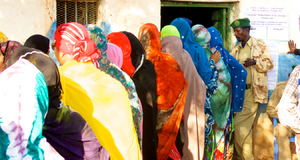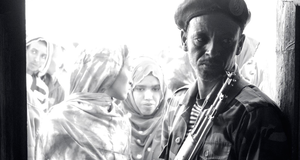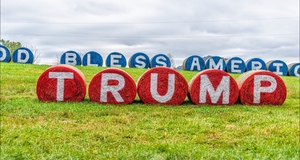Featured Article:Democracy Up Close in Somaliland: Reflections of an International Election Observer
By
2012, Vol. 4 No. 12 | pg. 1/3 | »
In May 1991, Somaliland emerged as a self-declared independent state in the aftermath of the failure and subsequent collapse of Siyad Barre’s Somalia. Although ethnically and linguistically Somalilanders are undifferentiated from their counterparts in southern Somalia, the northwestern region of Somalia has achieved an important distinction: while Somalia remains fundamentally anarchic, with no substantial national government to speak of, Somaliland is conversely peaceful, democratic, and remarkably safe by comparison. The de facto state held successful national elections in 2003 (presidential), 2005 (parliamentary), and again in 2010 (presidential). International Election Observers (IEOs), along with Domestic Observers (DOs), participated in monitoring each of these processes, concluding that elections were substantially free and fair. Nevertheless, Somaliland remains internationally unrecognized and is considered under international law to be a province of non-functioning Somalia. A cloud of dirt and dust marks the wake of our 4x4 as we speed through Hargeisa's empty streets at 4:30am. It's early morning on election day: roads are closed to all non-official traffic. We travel through Hargeisa, over the Maroodi-Jeex bridge that spans a bone-dry river, and through the town's low-lying sprawl. We're headed south and the driver knows the way by heart, because there are no signs. After turning at an inconspicuous side street, navigating off the road to travel around a crumbled building, we turn into what appears to me empty Somali bush. The tarmac ends abruptly, and the road – undifferentiated from the surrounding expanse of dirt and bush – becomes rough, twisting sharply left and right suddenly as the driver navigates divots and thorny shrubs. We are headed to Salaxley, a town southeast of Hargeisa toward the Ethiopian border. The drive for the next two hours is haunting: a full moon still low on the horizon casts a cool blue light over a landscape that looks, with little exaggeration, as if it might as well be the surface of the moon. There is no opportunity to relax, let alone sleep. Our car is flying across the landscape, a second vehicle loaded with two Special Protection Unit (SPU) gunmen variously speeding alongside or behind us. The bumps are jarring as the driver reacts to the onslaught of obstacles in front of us, slamming on the breaks at several points to avoid the worst of them in dramatic fashion. Cool air rushes in through the windows, welcome in anticipation of the sun that is now creeping into the scene. Today will be hot and dry. Like most other days here. Before entering Salaxley, we pass through a makeshift security checkpoint, the third since we departed Hargeisa. This one is typical: a tattered rope tied between two cement blocks blocking the road. It's early and still cool, so the guard is sitting by a fire. He walks over, AK-47 slung casually over his shoulder, to peer into the windows. Our red "international observer" hats and official National Election Commission (NEC) identity cards are sufficient, and the rope is lowered. Salaxley looks, inevitably, like a thousand other small Somali towns. The wide dirt strip running through the center of town is merely a continuation of the wide dirt landscape in which the town is situated. There is no vegetation anywhere in sight, save for the low scrub bushes and the occasional Acacia tree. To me, the location of the town seems utterly random: why here? It may as well be situated at any other location in a twenty-mile radius as far as I can tell. But, surely some reason exists. I know little of life here, and to me simple survival in this harsh landscape overwhelms comprehension. The town is comprised of a collection of makeshift buildings and shelters, stretching for perhaps 300 or 400 meters alongside the road. There are several small shops, perhaps just three or four shelves selling a few items, dotted into faded mud-brick buildings. At least one dirt-floored 'restaurant' is constructed of sticks, metal sheeting, plastic, and other found materials. 'Baasto' is on the menu. But, we are not here to eat (though we will return for that purpose hours later). The first polling station of the day, No. 419, is located on the edge of town. Situated in a tiny crumbling building, two lines – one for men, one for women – are already forming outside. It's 6:30am, and polls open in 30 minutes. My partner Nada and I loop our NEC credentials around our necks and don the bright red ‘international observer’ hats; hers goes over a headscarf gracefully encircling her face. As we step out of our vehicle, eyes are on us. But, the faces we see are excited and predominantly friendly. Our presence means that the world is watching Somaliland, even in the tiny town of Salaxley, seemingly a place removed from the hum of our increasingly connected world. Glancing around at the building, I notice a party flag flying next to the door. Xaqsoor's (pronounced similarly to 'hack-saw') colors are yellow and white, but they should not be raised here. The campaign period is over; Somaliland election laws dictate that polling stations must be free of campaign materials on election day. But, perhaps nobody got the memo. The crowd outside the door parts for us, and the policeman at the door – military fatigues, black boots, blue beret, and a well-used automatic rifle over one shoulder – glances quickly at our cards before allowing us to enter. Inside, there is barely enough room to move. ___________________ The polling station staff includes four people: a chairman, secretary, and two 'scrutineers' responsible for inspecting and applying the all-important 'indelible' ink, which will in theory serve as a sufficient replacement for a national voter registry. Ideally, the first scrutineer greets voters by inspecting the little finger of their left hand for ink. If no ink is found the voter steps in to the polling station chair and secretary, where one records by hand the voter's name and approximate age in a record book containing a hand-written log of every ballot number. If the voter is under 16 years of age, judged according to appearance because few people have any kind of official identity document, a ballot is issued. If the voter appears too young, the chair and secretary can question the person to determine their age. In a dispute, someone from the community – perhaps an elder, or just a neighbor – can be consulted. Once the ballot is issued, a makeshift voting booth is located in the corner behind a white sheet, strung up with string to a nearby bench. The ballot box, a clear plastic bin sealed with plastic ties on the corners, is on the floor in the middle of the room, within sight of all. In theory, the process is sound, democratic, and transparent. In practice, the challenges of making this system work well in Somaliland – or, probably, any place facing the particular constellation of issues that Somaliland faces – are significant. Our experiences over the day will reveal as much. In addition to the polling station staff, agents for each party – Kulmiye, UCID, Rays, Waddani, Dalsan, Umadda, and Xaqsoor – are seated along the walls of the room, the goal of increased transparency clearly in mind. No one without official credentials, with the exception of voters, should be inside the polling station at any time. In particular, men with guns should remain outdoors. But that rule, too, we found lacking in practice. In total, that means at least eleven people should be inside the station at all times, in addition to the requisite voting materials. The ballots are large and complicated, essentially 11x14 sheets of paper. With all the necessary tables, chairs, and benches to accommodate these people, and most stations little more than a twelve-foot by twelve-foot room, space is limited.Continued on Next Page » Suggested Reading from Inquiries Journal
Inquiries Journal provides undergraduate and graduate students around the world a platform for the wide dissemination of academic work over a range of core disciplines. Representing the work of students from hundreds of institutions around the globe, Inquiries Journal's large database of academic articles is completely free. Learn more | Blog | Submit Latest in Political Science |


















